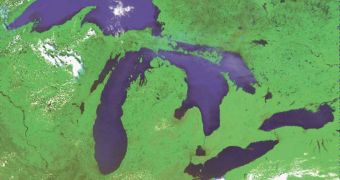The results of a study conducted by the US National Oceanic and Atmospheric Administration (NOAA) indicate that the Great Lakes will lose less water in the near future than what other investigations proposed they would.
Understanding how this critical economic area will react to global warming and climate change is very important for NOAA, and the United States. The new research is published in the latest issue of the Journal of Great Lakes Research.
NOAA investigators used a different research approach for compiling this model, which partially explains the different results. One of its main advantages is that it better takes into account the influence of atmospheric greenhouse gases on evaporation.
“The models show lower loss of water to vapor, meaning that more water is staying in the Great Lakes basin,” explains Brent Lofgren, PhD, who is a researcher at the NOAA Great Lakes Environmental Research Laboratory (GLERL) in Ann Arbor, Michigan.

 14 DAY TRIAL //
14 DAY TRIAL //